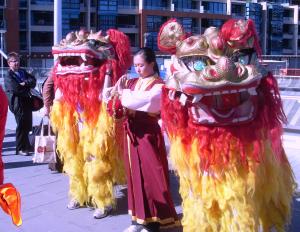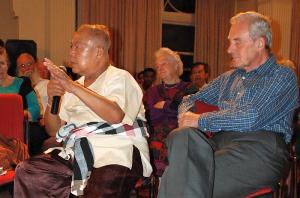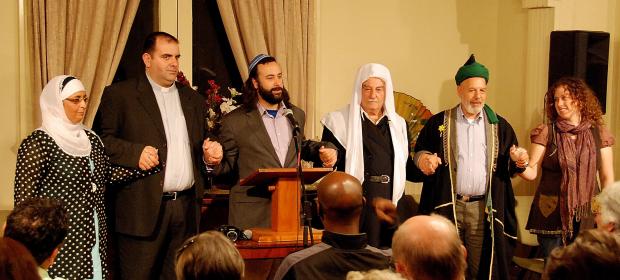 The fifth Parliament of the World’s Religions took place in Melbourne, 3–9 December 2009, with over 6,000 from 200 countries representing all the world’s major faiths. Part religious festival, part pageant, the Parliament was above all a massive conference and meeting of hearts, minds and spirits. At any one time there were up to 20 sessions happening simultaneously.
The fifth Parliament of the World’s Religions took place in Melbourne, 3–9 December 2009, with over 6,000 from 200 countries representing all the world’s major faiths. Part religious festival, part pageant, the Parliament was above all a massive conference and meeting of hearts, minds and spirits. At any one time there were up to 20 sessions happening simultaneously.
Major themes were discussed: the role of religions in resolving conflicts; how to get moral and spiritual values into economic life; the insights of indigenous peoples; climate change and more.
In the words of Martin Frick, Director of the Global Humanitarian Forum, ‘It is the world’s largest gathering of grassroots organizations’ – over four billion people claim allegiance to one or another religion. Frick was there to engage with faith groups over climate change, with the help of Initiatives of Change, before heading to Copenhagen for the COP15 meeting. This was achieved in several ways, including a series of video interviews (available on the Initiatives of Change Environment blog http://iofcenvironment.wordpress.com/). A 60 metre scroll was also sent to the Copenhagen conference inscribed with messages and prayers from participants at the Parliament.
Among those attending were some of the world’s leading Muslim thinkers such as Professor Tariq Ramadan, Dr Chandra Muzaffar and Imam Abdul Feisal Rauf. President Obama sent some of his senior staffers to the Parliament to learn from Muslim leaders how best to interact with the Muslim world. Rauf was quoted as saying ‘It was a great indicator of hope, and an important part of the parliament’.
Professor Hans Küng launched a manifesto for a global economic ethic, building on the work done over the last decade-plus on distilling and clarifying the shared moral values of the world’s religions. If these values were ignored, he said, the world would probably sink into another financial crisis worse than the last, because several crises were interlinked: economic, climate change, poverty and wars.
The progamme included several offerings by Initiatives of Change including a Creators of Peace workshop and session on ‘Learning to forgive: healing our past, creating our future’ featuring IofC author Michael Henderson. The documentary film The Imam and the Pastor by IofC’s FLTfilms was screened and discussed in two separate sessions facilitated by Professor Paul Wee from the Elliott School of International Affairs, George Washington University. Michael Henderson’s session was attended by Alexandra Asseily, the driving force behind the Garden of Forgiveness in Beirut, who has worked with the IofC team in Lebanon.
The final day of the Parliament saw the Dalai Lama take the stage alongside Auntie Joy Murphy Wandin, senior Elder of the Kulin Nation who had welcomed the participants to the traditional lands of her Aboriginal people six days earlier. Picking up the central theme of the Parliament, ‘Making a World of Difference’, the Dalai Lama told us, ‘now is the time to act’.
Can anyone be a peacemaker?
 Outside the official programme, Armagh, the IofC centre in Melbourne, hosted two occasions with speakers from the Parliament. The first, ‘Can anybody be a peacemaker?’, featured Michael Henderson and Sulak Sivaraksa, Thai founder of the International Network of Engaged Buddhists, who has worked over many decades to fight injustice and discrimination in Asia.
Outside the official programme, Armagh, the IofC centre in Melbourne, hosted two occasions with speakers from the Parliament. The first, ‘Can anybody be a peacemaker?’, featured Michael Henderson and Sulak Sivaraksa, Thai founder of the International Network of Engaged Buddhists, who has worked over many decades to fight injustice and discrimination in Asia.
Sivaraksa said that to become a peacemaker required qualities of honesty and humility. ‘Try to do it not because of yourself. In the Christian context you are guided by the Holy Spirit. In the Buddhist context you are guided by Bhodhisattva. It is not you who will achieve peace.’ Secondly, he said, ‘you must take the other side seriously... listen to them.’ He spoke of his own experiences trying to build bridges of trust with the Muslim and Malay minorities in the south of his country. ‘We Thais have been exploiting the Malays. If you go out to them you must be honest and ask for their forgiveness.’ As well as compassion for those who have been oppressed, he said, it was important to also understand the oppressors. ‘As the Christians say, you must hate the sin but not the sinner. To love humanity is easy but to love your neighbour is not very easy.’
Henderson spoke about the need to ‘hate-proof’ society in a world where ‘every perceived wrong and every historic wrong is out there on the internet and immediately accessible through Google’. His own contribution, he said, was to tell stories of people reaching out to the ‘other’. The occasion was the Australian launch of his latest book No Enemy to Conquer – one of several he had written dealing with the theme of forgiveness.
Forgiveness was a process rather than an event, said Henderson. ‘There is always a next step.’ He told the story of Jo Berry whose father was killed when the Provisional Irish Republican Army blew up the Grand Hotel in Brighton in an attempt to kill Prime Minister Margaret Thatcher and the British Cabinet. The man responsible for planting the bomb, Patrick Magee, was released from prison (where he was serving eight consecutive life-sentences) under the terms of the 1998 Good Friday Peace Agreement. Since then Jo and Patrick had had a series of conversations. Jo described the choice she faced ‘to stay as a victim, blaming others for my pain, or to go on a journey of healing and understanding.’
Part of that journey involved wrestling with the question of ‘how best to honour our ancestors?’
‘When Jo spoke of forgiveness on British TV she received a death threat from someone who said she had betrayed her father and her country. Pat [Magee] wrestles with the question of how best to honour the commitment of the Irish nationalists who came before him. If you admit that a course of action was wrong are you then accused of betraying your heroes? Can new situations allow you adopt new truths. Neither Pat nor Jo are comfortable with the word forgiveness. But to my mind they are on a journey that shouts that out whatever the outcome.’
You can download the sound recording of the meeting here.

A second evening, ‘Sparks of peace’, featured a group of Jewish, Christian and Muslim peacemakers from the Holy Land. Ibtisam Mahamid, a Palestinian woman whose family had been dispossessed in 1946, described the emotions she had felt after being thrown off a bus for no reason other than that she looked Palestinian Arab. She then moved from hatred to trying to understand the pain, suffering and fear which lay behind these actions. Reading about the holocaust, she said, she ‘cried for a week’. Each of the group had similar experiences of reaching out to understand the pain of the other, which enabled them to work on bringing down the walls of fear and mistrust.

